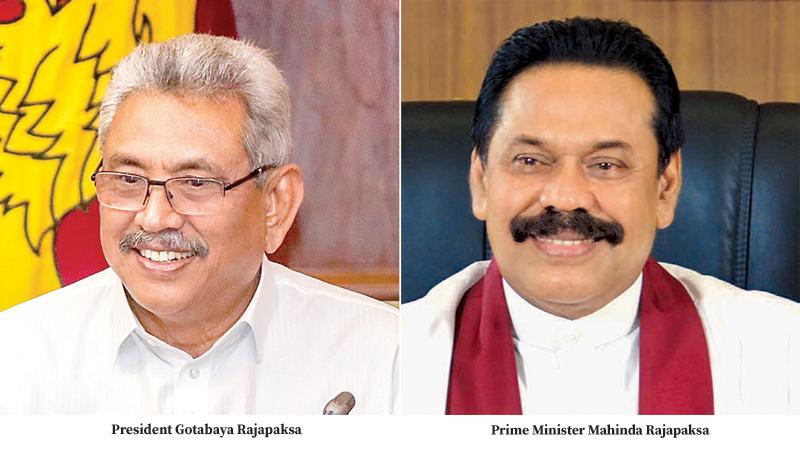
Last week Sri Lanka’s political landscape experienced ‘upheavals’ to the surprise of all Sri Lankans and the world at large, when the Sri Lanka Podujana Peramuna (SLPP), headed by the Rajapaksas won 19 electoral districts out of 22, commanding an aggregate of 145 seats.
The electorate more than giving an overwhelming mandate – has qualified the SLPP for a two-thirds majority in Parliament to run the country without let or hindrance.
Parallel to the SLPP victory, the uprooting of the monolithic UNP which ran the country for almost forty years is spectacular, to say the least.
The people have now pinned their hopes in President Gotabaya Rajapaksa and Prime Minister Mahinda Rajapaksa to mainly salvage the economy and ensure a higher standard of living for thme.
Taking of oath
To get down to work, Prime Minister Mahinda Rajapaksa will take the oath of his office tomorrow before his sibling President Gotabaya Rajapaksa, at the auspicious hour at the Kelaniya Raja Maha Vihara, heralding a new era in the country.
Of all previous elections, the 2020 General Election is more remarkable in the annals of the country’s history due to land marks such as the Prime Minister winning a record 527,364 preferential votes, former Prime Minister and UNP boss Ranil Wickremesinghe being relegated to the political wilderness, cracks appearing in the North’s Tamil political leadership, SLFP winning a solitary seat in the Jaffna peninsula, increasing the member of slots for professionals in the SLPP national list and many new faces with academic distinction being voted to the national legislature.
Women representation in Parliament dropping to seven from thirteen in the previous government, is not a salutary development in the context of the women’s well-being and security.
It is significant to note that this election pensioned off 33 MPs of the previous government. Among them the notables are Rajitha’s beloved son, Chathura Senaratne, JVP heavy weights Dr. Nalin Jayatissa, Bimal Ratnayake and Sunil Handunnetti of COPE fame and Hirunika Premachandra and other UNP stalwarts such as P.Harrison and Chandrani Bandara.
There are neophytes from Ratnapura, Trincomalee, Kandy, Vanni, Hambantota, Kalutara, Badulla, Nuwara Eliya, Kegalle, Matale, Digamadulla, Anuradhapura, Kurunegala, Colombo, Polonnaruwa, Moneragala, Matara, Gampaha and Batticaloa elected to Parliament this time.
Father and son
A few ‘father and son couples’ such as Mahinda and Namal Rajapaksa, Chamal and Shasheendra Rajapaksa, Janaka and Pramitha Bandara Tennakoon are in the new Parliament, possibly with Dinesh Gunawardene and his son.Voters are much more enlightened in casting their preferential votes. Topping the preferential votes list are, Prime Minister Mahinda Rajapaksa, his young son Namal Rajapaksa, Ramesh Pathirana, Vidura Wickremanayake, Security Forces defender Sarath Weerasekera, Wimal Weerawansa, Nalaka Godahewa, Dilum Amunugama, Jeewan Thondaman, Pavithra Wanniarachchi and a few others.
Colombo, Kandy and Badulla are purported to be the UNP strongholds but this time voters have driven the UNP into a situation of committing political hara-kiri with the exit of leader Ranil Wickremesinghe, General Secretary Akila Viraj Kariyawasam, Assistant Leader Ravi Karunanayake, leadership aspirant Navin Dissanayake, Daya Gamage, Range Bandara and P. Thevarapperuma from the political circus.Death row convict Premalal Jayasekera has won his seat with 104,237 preferential votes, unprecedented in the history of pPrliamentary elections of Sri Lanka.The evolution of politics in Trincomalee is worthwhile examining.
Its demography with the Sinhalese, Tamils and Muslims living in harmony have been instrumental in changing the voting pattern at elections.The TULF monopolised politics in Trincomalee for a long time, until the UNP secured a strong foothold with the Muslims in the area beginning to align themselves with it. The Muslims have become the main political bargainer today.‘UNP disappears from Colombo’, a weekend newspaper blared out.
What happened to the UNP in Colombo? Colombo South, Colombo North, Colombo Central and Colombo East have a substantial mixed population of Sinhala, Tamils and Muslims living in unison had traditionally voted for the UNP for reasons dear to them.
As in other electorates the leadership crisis, which eroded the party fabric and the sagging morale of a once indefatigable party, would have compelled them to think twice before casting the ballot.Now that the dust has begun to settle, the new government will be quick to launch development projects and resolve all outstanding issues to herald a new era of prosperity and splendour in the country.
